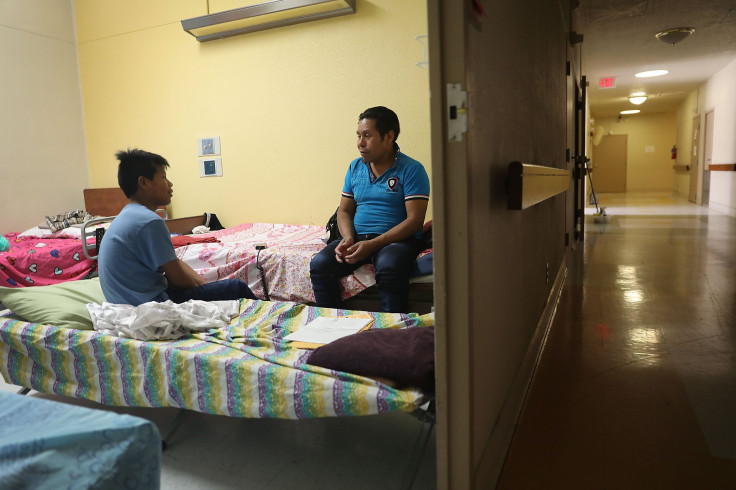Loan Market Shrugs Off Prison Financing Protests

NEW YORK - The U.S. leveraged loan market appeared to shrug off protests at the center of a national immigration debate that saw illegal immigrants separated from their children as advocates take aim at banks financing companies that run detention centers.
Advocacy groups in New York gathered Wednesday near JP Morgan Chief Executive Officer Jamie Dimon’s apartment, calling on the bank to stop lending to private prison and immigration detention companies, according to the Center for Popular Democracy, one of the protest organizers.
Banks including JP Morgan and Bank of America Merrill Lynch have extended more than a combined $2.5 billion of loans and other debt to the Boca Raton, Florida-based GEO Group and Nashville, Tennessee-based CoreCivic, operators of private prisons and detention centers.
Immigration is the subject of a heated national debate after President Donald Trump in April signed a memorandum ending the policy known as ‘catch and release,’ in which illegal immigrants were not held while awaiting a court hearing.
Massive protests followed after children were separated from their parents at the border. Following a court order, the government said Thursday that around 1,400 of the approximately 2,500 children separated from their parents have been reunited with their families, Reuters reported. Advocates are now turning their attention to the banks backing detention centers.
“The Wall Street firms are in some ways hiding behind the veil,” said Ana Maria Archila, co-executive director of the Center for Popular Democracy. “Without these investments, these companies simply couldn’t operate.”
Despite the protests, GEO Group’s $792 million term loan has held steady, quoted at 99.75-100 cents on the dollar Thursday, unchanged from Tuesday, according to two sources. CoreCivic’s $200 million term loan is not widely quoted.
“You do have categories of investments that are toxic,” said Richard Farley, chair of leveraged finance at law firm Kramer Levin Naftalis & Frankel. “But I don’t see any evidence that the [U.S. Immigration and Customs Enforcement (ICE)] issue is anywhere near a level of toxicity where banks would be concerned with reputational risk.”
Dimon sent a message June 19 to all US JP Morgan employees saying the bank strongly supports U.S. immigration reform, noting the problems are “tearing apart our body politic and damaging our economy,” according to the memo.
He noted that the Business Roundtable, a group of US chief executive officers that he chairs, released a statement urging “the administration to end immediately the policy of separating accompanied minors from the parents. This practice is cruel and contrary to American values.”
JP Morgan helped finance both GEO Group and CoreCivic. BNP Paribas, BAML, Barclays, SunTrust and Wells Fargo also led GEO Group’s financing, while a group including SunTrust, BAML and PNC joined JP Morgan in arranging CoreCivic’s credit facility, according to regulatory filings.
A JP Morgan spokesperson declined to comment.
Wells Fargo said it respects the seriousness of the country’s ongoing debate about immigration and the criminal justice system. “However, we do not as a corporation take positions on public policy issues that do not directly affect our company’s ability to serve customers and support team members,” a bank spokesperson said.
Spokespeople for other lenders either declined to comment or did not return requests for comment.
“It is understood that banks are largely comfortable with lending to the sector at this time, but many have ongoing review processes based on the publicity surrounding the issue,” a senior banker said.
A CoreCivic spokesperson did not respond to an email seeking comment. In June the company released a statement that says it does not enforce immigration laws or policies. It says that none of its facilities provides housing for children that are without parental supervision.
In an April lender presentation to cut its interest payments, GEO Group offered an industry overview of immigration enforcement, according to a source. It highlighted President Trump’s executive order to end ‘catch and release’ as well as additional government funding available for more detention beds.
Moody’s Investors Service on Tuesday said GEO Group’s B1 corporate family rating reflects its solid liquidity position, stable operating performance and increased capital market access.
GEO Group is a long-standing service provider to the government and does not have a role in setting criminal justice or immigration policies and does not advocate for or against criminal justice or immigration enforcement and detention policies, a company spokesperson said in an emailed statement. He said the facilities it manages on behalf of the federal government have never housed unaccompanied minors.
Last year, Moody’s revised GEO Group’s rating outlook to stable from negative and CoreCivic’s outlook to stable from negative after Attorney General Jeff Sessions’ February 2017 memorandum reversed the US Justice Department’s August 2016 plans to phase out its use of privately-operated prisons.
Reuters
Reporting by Kristen Haunss, Jonathan Schwarzberg and Yun Li; Editing by Tessa Walsh and Michelle Sierra
© Copyright Thomson Reuters 2024. All rights reserved.





















